
Beijing is watching developments in Ukraine with an eager eye. It has key economic interests at stake and a shared goal with Russia in undermining Western soft power and liberal institutions.
It also has an economic interest, with Russia relying on China to bail it out if the West does impose harsh economic sanctions.
In a joint statement prior to meeting at the Beijing Winter Olympics opening ceremony, Xi Jinping and Vladimir Putin agreed to deepen cooperation across a range of security, political and economic areas. Chinese state energy giant CNPC committed to the purchase of 10 billion cubic metres of gas a year from Gazprom, as further Western sanctions on Russia loom. China has declared a “no limits” backing for Russia in its stand-off with the US and Nato – Beijing and Moscow have not been in a tighter embrace since the 1950s.
But there’s also something closer to home weighing on Xi’s mind.
Xi has repeatedly declared an intention to reunify with Taiwan, the democratically-governed island roughly 100 miles from the southeast coast of China that Beijing claims as its own.
Foreign policy wonks have been quick to link the crisis in Ukraine to the fate of Taiwan. Some have claimed that if like-minded democracies fail to intervene militarily in Ukraine, it will signal to Beijing that there will be a similar hands-off strategy in the event of an attack on the island. Others have suggested that we would lose our moral basis for objecting to China’s demands on Taiwan.
The withdrawal of Western troops from Afghanistan was a similar flashpoint for foreign policy analysis, with people positing that American isolationism would stretch to an ambivalence over the future of Taiwan.
It’s true that Beijing considers Ukraine something of a litmus test of the West’s appetite for armed conflict and our capacity to allocate attention and resources to multiple global flashpoints simultaneously. In return for helping alleviate the impact of western sanctions on Moscow, Xi will expect Putin’s support for his own regional ambitions over Taiwan.
Taiwan is raising its preparedness in response to developments on the Ukrainian border. President Tsai Ing-wen hastily ordered the creation of a task force to study how the confrontation thousands of miles away in Europe could affect Taiwan’s longstanding conflict with its larger, vastly more powerful neighbour. Taipei indicated over the weekend that “all military units” are paying close attention to China’s movements in the Taiwan Strait.
But the island is accustomed to vigilance. The past two years have seen a noticeable uptick in military activity near the South China sea, a key battleground. In Tsai’s own words: “Taiwan has faced military threats and intimidation from China for a long time”.
The situations Ukraine and Taiwan face are also governed by entirely different geopolitics.
For one – the independence of Ukraine is not a vital security interest to the US, while the independence of Taiwan is. In its new Indo-Pacific strategy, unveiled last week, the US vowed to support Taiwan’s self-defence capabilities.
Other democratic nations have a great deal at stake with Taiwan given their historical obligations, economic interests, and newfound aspirations for alliance and partnership building in the Indo-Pacific. Only last week, British lawmakers pledged to deepen cooperation with the island and support its engagement with the international community. The EU has also recently codified the step-up of its strategic engagement with the Indo-Pacific region as a whole.
Ryan Hass, a former China advisor to President Obama, suggested that a Russian invasion of Ukraine could in fact galvanise the US and its allies to show greater strength in the Pacific so that China doesn’t draw any wrong lessons from Putin’s incursion.
From Beijing’s perspective, its strategy to shift the cross-Straits status quo in its favour has, so far at least, revolved around relentless economic and diplomatic pressure, rather than direct military action. In a year that Xi will seek an unprecedented third term at the Chinese Communist Party’s 20th Party Congress, stability will be prioritised above all else.
Taiwan’s own presidential office has acknowledged that the situation in the Taiwan Strait is “fundamentally different” from that of the embattled Eastern European state. Lazy parallels only serve to undermine the severity of both threats and bolster the perceived power of Putin and Xi, the two most dangerous autocrats.
For all the latest Lifestyle News Click Here
For the latest news and updates, follow us on Google News.